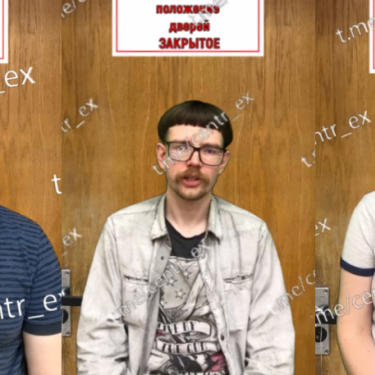Belarus: RSF shocked by humiliating methods used against journalists

The latest journalists and media workers to be arrested in Belarus are being forced to make confessions that are filmed by officials with the internal affairs ministry and are posted online. Reporters Without Borders (RSF) is outraged by such practices, which constitute a gross violation of international law, and calls for them to stop.
Read in Russian / Читать на русском
”Psychological torture and Stalinist methods such as public forced confessions and denunciation are the new trend in the eradication of independent media in Belarus,” said Jeanne Cavelier, the head of RSF’s Eastern Europe and Central Asia desk. “After a dramatic crackdown in 2020, Alexander Lukashenko’s government is leaving no chance for press freedom to exist and for journalists to be safe. We are outraged by the shocking nature of this mistreatment and we call on the Belarusian authorities to stop arresting and humiliating journalists who just do their job.”
June saw eight new arrests of media workers in Belarus, seven of them recorded in degrading videos by government officials that were posted online together with derisive comments about their work. Most of them were detained in connection with their coverage of opposition rallies in 2020. They were arrested either after a targeted search by security forces or after an anonymous denunciation via a special chatbot on a pro-government Telegram channel known as “Centre E.”
The victims include Vital Andras, the director of Dev.by, an online media outlet specialising in information technology, and his wife, Elena Andras, the outlet’s accountant. After their arrest on 23 June, they were forced to confess on camera to “distributing extremist materials” during the 2020 rallies.
The video of their confessions was posted on “Centre E,” which said they had used their “anti-government” media outlet to “deliberately incite negative emotions about their country for the sake of so-called European values,” and that they were trying to “incite a coup”.
Freelance photographer Yauhen Yerchak was dressed in a military helmet with a white-red-white flag (a symbol of the protests), and Nazi labels around his neck in the mocking photo with a ridiculous description that was posted on 13 June. He was called a “fascist” and was accused of cooperating with an “extremist” organisation, namely, Belarus’s most popular news site TUT.BY (now Zerkalo.io).
After being sentenced to 15 days in prison for disobeying the police, he was released on 29 June, but he is threatened with the possibility of further proceedings as the police seized his photo and video archives and are now “studying” them.
The law is being flouted in a similar manner with Belarusian journalists who try to cover Russia’s invasion of Ukraine. Yury Hantsarevich is facing a possible six-year jail sentence as a ”traitor” after the security forces discovered he was cooperating with Radio Svaboda (the Belarusian branch of the US government-funded Radio Free Europe/Radio Liberty) as well as with Zerkalo.io. Like Zerkalo.io, RFE/RL is labelled as “extremist.”
A reporter for Intex-press, a local newspaper based in Baranavichy, Hantsarevich was arrested on 5 May and was charged with “promoting extremist activities”. In the video posted online, he describes the process of working with media outlets, shows his correspondence with media representatives and, obviously under duress, confesses to repenting of his misdeeds.
Three journalists with ABW.by, a media outlet specialising in automobile technology, confessed in videos posted online on 16 June to “lying,” “disinformation” and blocking pro-government news from their site. Criminal charges have been brought against two of the journalists, editor-in-chief Yulia Mudreuskaya and special project editor Yury Gladchuk. The third journalist, Vadzim Ziankevich, has been released.
Previously, forced video confessions were mainly used with activists and opposition supporters. This latest trend shows that the authorities have embarked on a “moral” battle against the independent media outlets still remaining in Belarus. Some of the social media channels used to combat freedom of expression are occasionally blocked, but they have clones and regional versions.
The “Centre E” Telegram channel identifies itself as being operated by the Directorate for Combatting Extremism, the state agency known for catching such opposition figures as Raman Pratasevich, a journalist who was arrested on 25 May 2021 after his plane was hijacked on Lukashenko’s order and who was himself forced to deliver televised confessions.
A total of 32 media workers are currently detained in Belarus and the persecution of journalists launched in 2020 is still going on.
